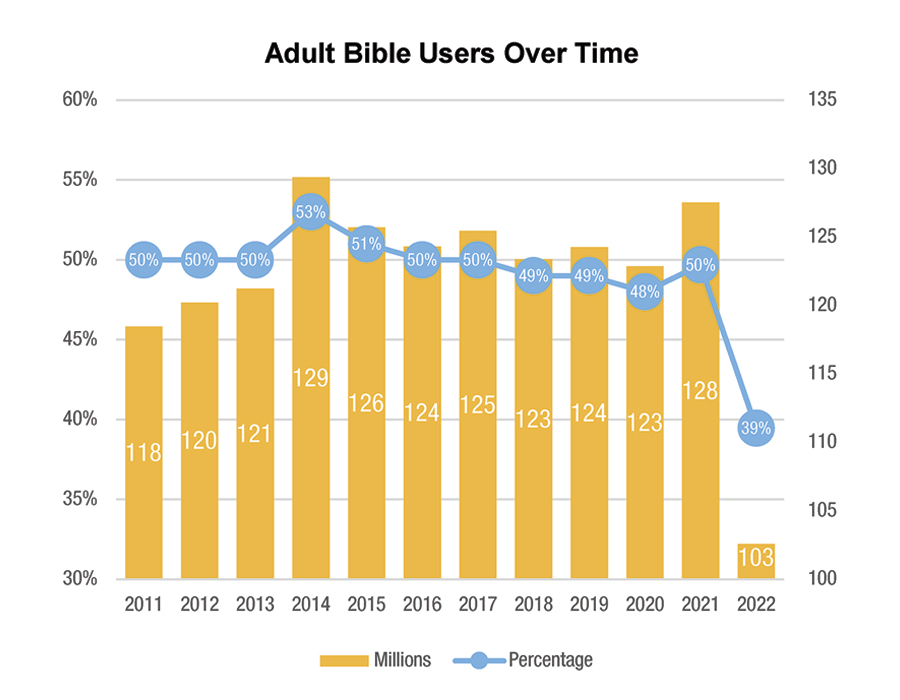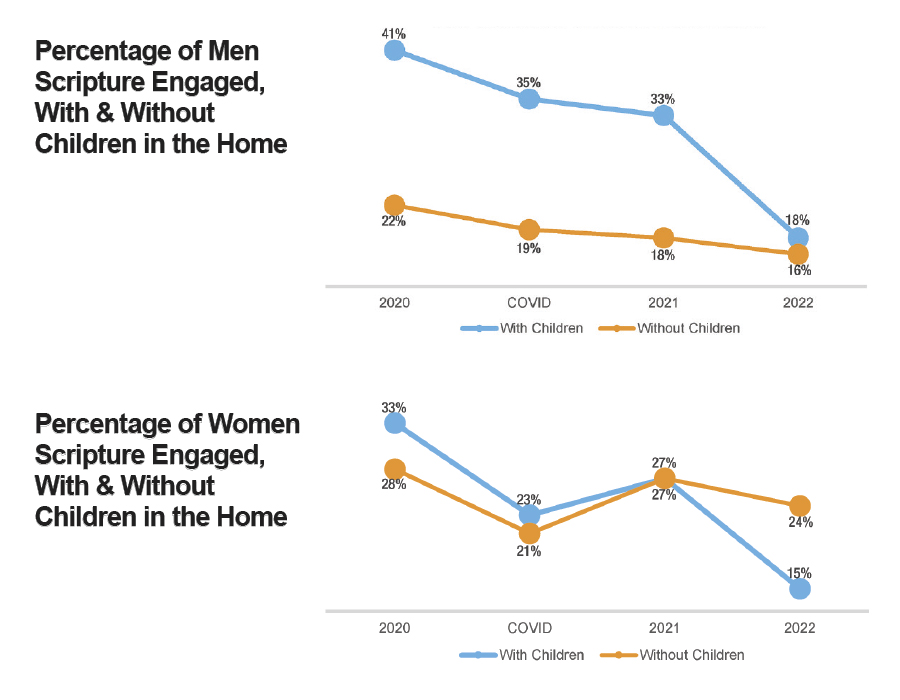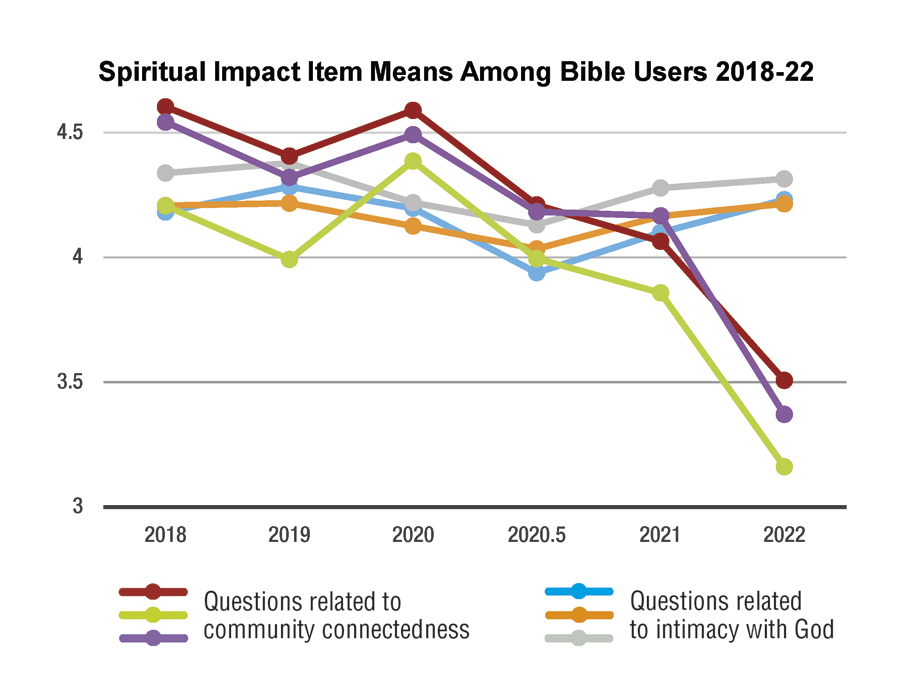Bible Engagement in America
What every church leader should know — and do
I got the news on Valentine’s Day 2022, and it broke my heart.
American Bible Society’s annual State of the Bible results were in, reporting on the Scripture engagement of U.S. adults. After positive results in 2021, we hoped for more good news this year.
But as my colleagues and I charted the new data, it looked like Scripture engagement had fallen off a cliff. In one year, 15 million Americans had left the ranks of the “Scripture Engaged.” On the other side of the chart, the “Bible Disengaged” — people with little or no interaction with Scripture — grew by 45 million.
The Bible I love is being neglected, just when it seems our nation needs it most. As I pored over these statistics, I kept asking myself, Is there anything we can do to turn things around?
Declining Usage
One of the simplest measures in the survey is Bible use — reading the Bible or listening to it, apart from church services. We define a Bible user as one who uses the Bible at least three times per year.

Over the past decade, State of the Bible has consistently found that about half of Americans were Bible users. In 2021, an estimated 128 million Americans had reached for the Bible at least three times in the previous year.
Bible use fell 10 percentage points in the most recent poll, however. Now only 4 in 10 Americans (39%) qualify as Bible users — the lowest figure we have ever documented.
You might assume everyone in your church is a daily Bible user, but our research through the years has shown 30% to 50% of churchgoers rarely read Scripture (or listen to it) outside of a church service.
A significant number of these people say they don’t use the Bible because they don’t know where to start. This highlights a call to action for any minister of the gospel: Create on-ramps to the Scriptures.
Family Concerns
Besides these decreases in Bible engagement, the State of the Bible statistics tell an alarming story about families.
In the January 2020 survey, just before the pandemic upended life in the U.S., adults with children in the home had much higher Scripture engagement scores than those without children. Men were nearly three times more likely to be Scripture engaged if they had children in the home.

However, that changed during the pandemic. The Scripture engagement of men with children in the home dropped to the same low level as those of men without children.
Mothers fared even worse, as the share of Scripture-engaged women with children (15%) fell significantly below that of Scripture-engaged women without children in the home (24%).
I suspect we’re seeing a disruption of the patterns of family life, brought on by COVID. Schooling changed. Work changed. Relationships changed. Childcare changed. Things got chaotic, especially for families.
Scripture engagement became more difficult for families that previously had regular times of Bible reading together, as well as for adults who structured their family schedules to allow for times of personal Bible reading.
Finding Answers
Beyond what was happening with parents, we wanted to tease out why Scripture engagement was falling in America, so we took a closer look at the specific survey questions we use to measure Scripture engagement.
In addition to questions about Bible use and beliefs about the Bible, we ask six questions about the spiritual impact of the Bible.
The first three questions relate to how the Bible affects a reader’s sense of connectedness with God.
The other three questions have to do with community and the Bible’s influence on feelings and behaviors toward others.
For example, we asked people whether spending time in Scripture leads to increased generosity with time, energy, or financial resources, and whether it results in more loving behavior toward others.

We discovered the three items about living out a biblical faith in relationship to others were driving most of the downturn in Scripture engagement among Bible users. In fact, the decline in outcomes related to community was more than six times greater than those related to intimacy with God.
Apparently, the big problem was not that people thought less of the Bible, but that it was having less impact on the ways they lived out their faith in community. Combined with the slump in Bible use, this proved disastrous for our Scripture engagement numbers.
It has been a rough couple of years. While we know Scripture can support and encourage us in hard times, it is also easy to become distracted amid life’s struggles — and we’ve had plenty of those.
Being generous with resources is difficult when you’re struggling to pay rent. It isn’t easy expressing love for others when people are picking fights with you on social media. And engaging in a community of faith is challenging when church is only convening online.
The pandemic disrupted life in many ways, and it may take some time to create new structures, schedules and habits. Even as people learn to live with COVID, they are still coping with its legacy. Many are feeling depleted — physically, emotionally and spiritually.
The Church’s Challenge
Church life has also faced major disruptions. Most churches had to shut down in the early weeks of the pandemic, and there have been lasting effects on the way we worship.
Some churches have maintained online services alongside in-person gatherings. Although worshipping online is convenient, it decreases opportunities for meaningful in-person connections. Remote church is necessary for some, but it is far from ideal for most.
Have you ever noticed how much of the New Testament is plural? For instance, Ephesians 4:25 says, “We are all members of one body.” And Hebrews 10:24–25 says, “Let us consider how we may spur one another on toward love and good deeds, not giving up meeting together, as some are in the habit of doing, but encouraging one another — and all the more as you see the Day approaching.”
Americans often think of faith as personal — and it is — but Scripture also makes it clear we are in this together.
We support and encourage one another as we live out our faith in ways that distinguish us from the surrounding culture. Love and generosity are basic elements of Christianity we experience and express in community. It is not surprising, then, that people reported less satisfaction in these areas during a time when fewer people were attending services.
As spiritual growth declines, Bible use declines — and vice versa. Christians need to get into the Word and then live it out in community.
Our analysis suggests a game plan for ministry going forward. First, help people start or resume interacting with the Bible. Then keep issuing the call to live in love and generosity and a thorough engagement with the Spirit.
Never has there been a greater need to hear God’s voice as we walk through a world that seems increasingly hopeless, stressed out, and fragmented.
The Bible energizes us to live out a vibrant and compelling faith as a prophetic alternative to the current culture. As we engage with God’s Word, we are transformed, and this transformation impacts all those around us.
This article appears in the summer 2022 issue of Influence magazine.
Influence Magazine & The Healthy Church Network
© 2025 Assemblies of God

